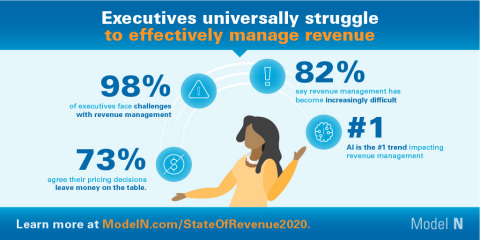SAN MATEO, Calif.--(BUSINESS WIRE)--Model N, Inc. (NYSE: MODN), the leader in cloud revenue management solutions, today announced details of a new executive report, the “2020 State of Revenue,” created to examine revenue management trends in the life sciences industry. Fielded in Q1 of 2020 by Dimensional Research and Model N to more than 300 senior executives in the U.S., the survey investigates the ways that companies are dealing with revenue management and how they can do better and explores the role that technology will have in revenue management moving forward.
Overall, findings from the survey indicate that C-suite executives struggle to achieve effective revenue management because it has become dramatically more complicated in recent years, limiting real-time understanding of net revenue and creating an environment of generally inadequate visibility into revenue performance. Some 82% say that revenue management has become increasingly difficult, and 81% of executives estimate the impact of losses to their industry in the trillions of dollars. Contributing factors include more volatile pricing and market demands and the need for global pricing management, appropriate discounts, rebates, incentives, and chargebacks, while addressing customer demands for price transparency and achieving regulatory compliance.
Revenue and Price Management Challenges
Amid this increasingly demanding environment, executives report that optimizing and managing revenue is a challenge. Specifically:
- 98% of executives say they face challenges with revenue management
- 82% say revenue management is increasingly difficult
- 73% agree that their pricing decisions leave money on the table
Price management is another critical area where companies face revenue management challenges, as the vast majority (96%) of companies in Model N’s study report that they face price management and that their customers are exposed to conflict pricing (98%).
Life sciences executives also reported the most prominent issues with the greatest potential to improve revenue management include contract management and compliance, regulatory compliance, pricing, and deal management. High levels of regulation have a direct impact on top-line revenue results, according to the data:
- 90% of executives report that regulatory compliance is frequently associated with lost revenue
- 56% of companies are being forced to accept lower price points, in order to avoid risk of regulatory errors
- 45% of executives report delaying revenue while regulations are in review
Executives Know Revenue Management Needs Improvement
Regardless of recent advances in technology – particularly around data and analytics – about two-thirds (65%) of executives surveyed are actually less confident in the accuracy of their revenue reports today than they were five years ago. Specifically:
- 95% report that they face issues with revenue leakage
- 63% expect that closing all revenue leakage would impact revenues by 4% or more
- 90% report regulatory compliance had a direct contribution to revenue loss
Technology Can Improve Outcomes
Those surveyed are well aware that improved technology, especially artificial intelligence, offers significant potential to positively impact business outcomes. Executives also see technologies like digital transformation and cloud applications as leading the way forward. Specifically:
- 99% believe their companies would benefit from additional revenue management capabilities and can identify places they can improve revenue management
- 91% agree that cloud is the ideal approach to revenue management technology
- 61% think better technology would add millions of dollars to their company’s top line
The results also illustrate that life sciences executives are hungry for more and better-quality decision-making data, as 48% report they need to make decisions with incomplete information, 41% say that they spend too much time chasing down information from people and systems, and only 36% of life sciences executives say that they have a single, integrated application for revenue management. Executives’ top priorities for improving revenue management include:
- Improving contract management and contract compliance
- Improving how to better manage pricing and discounts across various markets
- Ensuring regulatory compliance
- Improving real-time visibility into revenue performance
“These survey results illustrate the critical need for an overhaul of revenue management practices in the life sciences industry,” commented Melonie Warfel, VP and GM of Life Sciences at Model N. “What becomes clear is that revenue management is top of mind for C-level executives, and a new approach leveraging the latest technologies – including the cloud and data analytics – must be implemented across the board to ensure that life sciences companies can effectively compete in today’s complex and highly-regulated markets.”
More About the Survey
Fielded by Dimensional Research in January 2020, the online survey polled a total of 306 qualified individuals in the U.S. with direct responsibility for revenue management in an executive role. The primary research goal of the survey was to capture hard data to understand trends with revenue management among key industries. A variety of questions were asked on a range of topics, including current approach to revenue management, opportunities to improve, and the role of technology. Certain questions were repeated from a similar 2019 survey to enable trend analysis.
About Model N
Model N is a leading provider of cloud revenue management solutions for life sciences and high tech companies. Driving mission-critical business processes such as pricing, quoting, contracting, regulatory compliance, rebates and incentives, our software helps companies know and grow their true top line and maximize every revenue moment at speed and scale. With deep industry expertise, Model N supports the complex business needs of the world’s leading brands in pharmaceutical, medical technology, semiconductor, and high-tech manufacturing across more than 120 countries, including Johnson & Johnson, AstraZeneca, Novartis, Microchip Technology, and ON Semiconductor. For more information, visit www.modeln.com.

